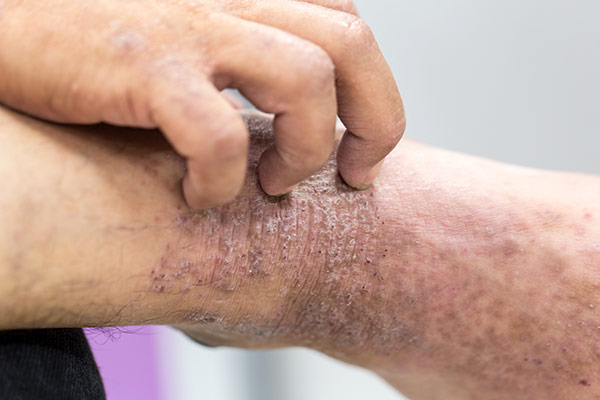Severe pruritus refers to an intense, persistent itching sensation that significantly disrupts a patient’s quality of life. Unlike occasional or mild itching, this condition is often chronic, resistant to over-the-counter remedies, and frequently linked to underlying systemic or dermatological disorders. In extreme cases, it can lead to sleep disturbances, anxiety, and physical damage due to incessant scratching.

Clinical Presentation and Symptoms
Patients suffering from severe pruritus may present with the following symptoms:
- Persistent itching lasting more than six weeks
- Excoriations, lichenification, and hyperpigmentation from chronic scratching
- Restlessness and sleep disruption
- Psychosocial distress, including anxiety and depression
- Itching without visible skin lesions, indicating a systemic origin
In some cases, pruritus may be generalized across the body or localized to areas like the scalp, back, or extremities.
Primary Causes of Severe Pruritus
1. Dermatological Conditions
- Atopic Dermatitis: Frequently seen in children and adults, associated with eczema and dry skin.
- Psoriasis: Chronic autoimmune condition that leads to red, scaly patches.
- Contact Dermatitis: Triggered by irritants or allergens such as soaps, metals, or plants.
- Urticaria (Hives): Characterized by wheals and intense itching.
2. Systemic Disorders
- Renal Insufficiency: Uremic pruritus is common in end-stage kidney disease.
- Liver Disease: Cholestatic liver conditions, like primary biliary cholangitis, often cause intractable itching.
- Hematologic Disorders: Polycythemia vera, Hodgkin’s lymphoma, and iron deficiency anemia.
- Endocrine Disorders: Hyperthyroidism or hypothyroidism can trigger or worsen pruritus.
- Infections: HIV, scabies, fungal infections, and parasitic infestations.
3. Neuropathic and Psychogenic Causes
- Neuropathic Itch: Arising from nerve damage due to conditions such as multiple sclerosis or postherpetic neuralgia.
- Psychogenic Pruritus: Associated with psychiatric conditions like OCD, anxiety, or depression.
Diagnostic Evaluation of Chronic Itching
A methodical approach is essential to determine the underlying cause of severe pruritus.
Clinical History
- Onset, duration, and progression of symptoms
- Associated systemic symptoms (fever, weight loss)
- Medications and recent exposures
- Family and dermatological history
Physical Examination
- Inspection for primary or secondary lesions
- Identification of distribution and pattern of itch
Laboratory Investigations
- Complete Blood Count (CBC): To detect anemia, eosinophilia, or malignancy
- Liver and Renal Function Tests: Rule out hepatobiliary or renal causes
- Thyroid Panel: To assess for hyper/hypothyroidism
- HIV and Hepatitis Panels
- Skin Biopsy: When diagnosis remains unclear or skin cancer is suspected
Treatment Strategies for Severe Pruritus
Topical Therapies
- Moisturizers: Emollients with ceramides to repair the skin barrier
- Topical Corticosteroids: Reduce inflammation in conditions like eczema
- Calcineurin Inhibitors: Tacrolimus or pimecrolimus for steroid-sparing use
- Capsaicin Cream: Helpful in neuropathic itch but may cause initial burning
Systemic Treatments
- Antihistamines: Sedating agents such as hydroxyzine for nocturnal itch
- Gabapentinoids: Gabapentin or pregabalin for neuropathic itch
- Antidepressants: Mirtazapine or SSRIs for psychogenic and idiopathic pruritus
- Cholestyramine and Rifampin: Used in cholestatic liver disease-related itch
- Biologics: Dupilumab for atopic dermatitis, omalizumab for chronic urticaria
Phototherapy
- Narrowband UVB Therapy: Particularly effective in chronic inflammatory and systemic pruritus
Preventive Measures and Lifestyle Adjustments
- Use of fragrance-free soaps and hypoallergenic skin products
- Regular skin hydration, especially post-shower
- Wearing loose cotton clothing to reduce irritation
- Avoiding triggers such as heat, sweating, and stress
- Maintaining mental well-being through counseling or therapy in psychogenic cases
Prognosis and Long-Term Management
Severe pruritus requires a multidisciplinary approach involving dermatologists, internists, and sometimes psychiatrists. Long-term prognosis depends on early diagnosis and successful management of the underlying cause. Chronic cases not only affect physical health but also profoundly impact emotional and psychological well-being.
When to Seek Immediate Medical Attention
- Sudden onset of severe pruritus with jaundice, fever, or weight loss
- No visible skin changes but persistent symptoms
- Signs of secondary infection due to scratching (pus, swelling, fever)
- Worsening despite appropriate home treatments
FAQs
What is the most common cause of severe pruritus?
Atopic dermatitis and systemic diseases like kidney or liver failure are among the most frequent causes.
Can severe pruritus be cured permanently?
Cure depends on identifying and treating the root cause; many cases are manageable with long-term control strategies.
Is severe itching a sign of cancer?
Yes, especially in cases like Hodgkin’s lymphoma or polycythemia vera, pruritus may be an early symptom.
Which doctor should I consult for chronic itching?
Start with a dermatologist. If systemic involvement is suspected, a referral to an internist or specialist may be needed.
Are there natural remedies for severe itching?
Oatmeal baths, cold compresses, and natural moisturizers may provide relief, but medical intervention is crucial for persistent cases.

